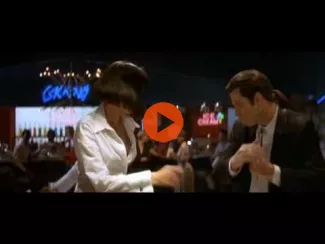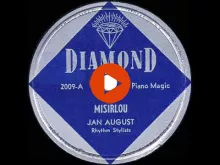The song "Misirlou" reappeared in the international scene in the 1964, becoming the music for Quentin Tarantino's film "Pulp Fiction" in 1994. Anna Vissi performed the song at the closing ceremony of the 2004 Athens Olympic Games.
Μισιρλού
Μισιρλού μου, η γλυκιά σου η ματιά
Φλόγα μου 'χει ανάψει μες στην καρδιά.
Αχ, για χαμπίμπι1, αχ, για λε-λέλι2, αχ,
Τα δυο σου χείλη στάζουνε μέλι, αχ.
Αχ, Μισιρλού, μαγική, ξωτική ομορφιά.
Τρέλα θα μου 'ρθει, δεν υποφέρω πια.
Αχ, θα σε κλέψω μέσ' απ' την Αραπιά.
Μαυρομάτα Μισιρλού μου τρελή,
Η ζωή μου αλλάζει μ' ένα φιλί.
Αχ, για χαμπίμπι ενα φιλάκι, άχ
Απ' το γλυκό σου το στοματάκι, αχ.
Missirlou
My Misirlu, your sweet gaze
A flame has lit in my heart.
Ah, my habibi1, ah, my le-leli2, ah,
Your two lips are dripping with honey, ah.
Ah, Misirlu, magical, elven beauty.
I will go crazy, I can't suffer anymore.
Ah, I will steal you from Arabia.
My black-eyed and crazy Misirlu,
My life changes with a kiss.
Ah, my habibi a kiss, ah
From your sweet little mouth, ah.
The song "Misirlou" reappeared in the international scene in the 1964, as the theme song for Quentin Tarantino’s cult film “Pulp Fiction”. But Misirlou1 was already a popular song since the 1920s, among the Rebetes and Smyrniots of the Athenian suburbs. With the mass immigration of Greeks to the United States in those years, the song spread to the Eastern Mediterranean communities there, first among the Greeks, then Armenians, Jews, Persians, etc.
The first version of Misirlou was recorded in the United States in 1927, by the orchestra of Michalis Patrinos and with Titos Dimitriadis on vocals, the former originally from Constantinople and the latter from Mani in the Peloponnese, but both immigrants to New York. Three years later, Patrinos recorded a version in Athens sung by himself. In 1934, a new recording was made in the United States, by the orchestra of Patrinos but in an arrangement by Nikos Roubanis, a professor of Arabic and Byzantine music. With Roubanis, the slow zeibekiko rhythm gives way to a more oriental melody and welcomes the first jazz influences that will become even more intense in the 1940 recording.
Since then, the recordings have followed one another, adapting to the colors of each era. In Greece, Danae Stratigopoulou and Sofia Vembo recorded Misirlou in the 1940s. Since then, artists such as Marinella, Glykeria, Kotsiras and many others have regularly performed the song. In the United States, several versions appeared, sometimes with English lyrics, others instrumental, even reaching the top of the charts, such as the version by Harry James in 1941 and Ian August in 1947. In 1962, Dick Dale played a "surf" version for electric guitar, which the Beach Boys would record the following year, while in 1994 it would become the theme song for Quentin Tarantino's film, Pulp Fiction. In 2004, Anna Vissi sang Misirlou at the closing ceremony of the Olympic Games in Athens.
- 1
Misirlou, a word derived from the Arabic Miṣr and the Turkish Mısırlı, means "Egyptian woman".



